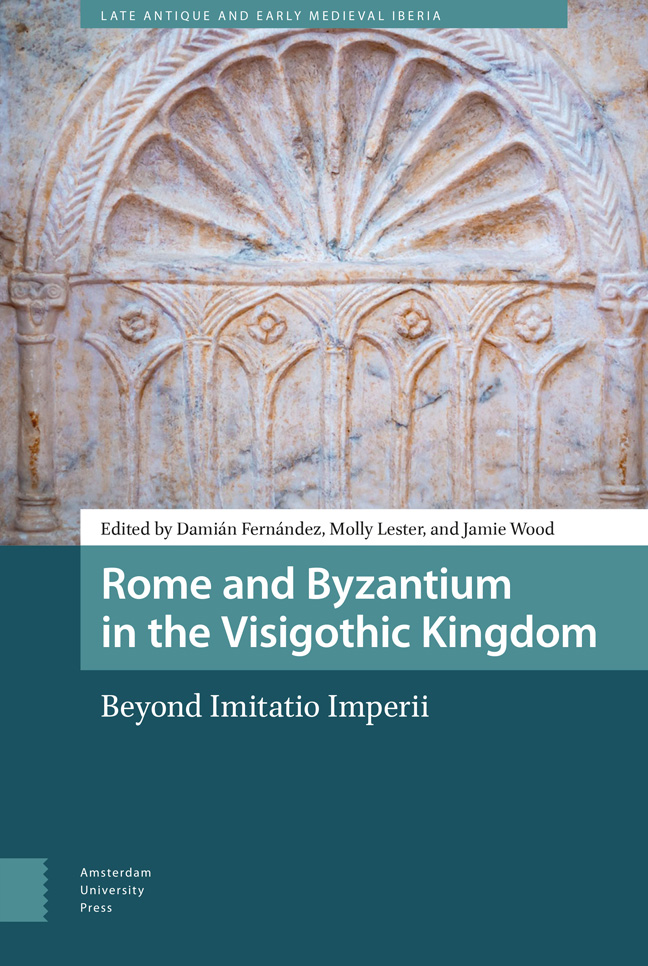Book contents
- Frontmatter
- Contents
- List of Figures and Tables
- Abbreviations
- Acknowledgements
- Maps
- Introduction
- 1 Visigothic Spain and Byzantium: The Story of a Special (Historiographical) Relationship
- 2 The Development of the Visigothic Court in the Hagiography of the Fifth and Sixth Centuries
- 3 Experiments in Visigothic Rulership: Minting and Monetary Reforms under Alaric II
- 4 A Comparison of Roman and Visigothic Approaches to Exile
- 5 The Roman Jewel in the Visigothic Crown: A Reassessment of the Royal Votive Crowns of the Guarrazar Treasure
- 6 Capitalhood in the Visigothic Kingdom
- 7 Making Rite Choices: Roman and Eastern Liturgies in Early Medieval Iberia
- 8 Ethnicity and Imitatio in Isidore of Seville
- 9 Re-imagining Roman Persecution in the Visigothic Passions
- 10 Romanness in Visigothic Hagiography
- 11 Empire and the Politics of Faction: Mérida and Toledo Revisited
- 12 The Agents and Mechanics of Connectivity: The Mediterranean World and the Cities of the Guadiana Valley in the Sixth Century
- 13 Staying Roman after 711?
- Index
7 - Making Rite Choices: Roman and Eastern Liturgies in Early Medieval Iberia
Published online by Cambridge University Press: 20 February 2024
- Frontmatter
- Contents
- List of Figures and Tables
- Abbreviations
- Acknowledgements
- Maps
- Introduction
- 1 Visigothic Spain and Byzantium: The Story of a Special (Historiographical) Relationship
- 2 The Development of the Visigothic Court in the Hagiography of the Fifth and Sixth Centuries
- 3 Experiments in Visigothic Rulership: Minting and Monetary Reforms under Alaric II
- 4 A Comparison of Roman and Visigothic Approaches to Exile
- 5 The Roman Jewel in the Visigothic Crown: A Reassessment of the Royal Votive Crowns of the Guarrazar Treasure
- 6 Capitalhood in the Visigothic Kingdom
- 7 Making Rite Choices: Roman and Eastern Liturgies in Early Medieval Iberia
- 8 Ethnicity and Imitatio in Isidore of Seville
- 9 Re-imagining Roman Persecution in the Visigothic Passions
- 10 Romanness in Visigothic Hagiography
- 11 Empire and the Politics of Faction: Mérida and Toledo Revisited
- 12 The Agents and Mechanics of Connectivity: The Mediterranean World and the Cities of the Guadiana Valley in the Sixth Century
- 13 Staying Roman after 711?
- Index
Summary
Abstract
In the sixth and seventh centuries, the liturgy was an important medium through which Iberian kingdoms sought to claim Christian orthodoxy. While some Iberian liturgical practices had ancient origins, others were the product of more recent exchanges across the Mediterranean, and a few were deliberately borrowed from contemporary Rome or the East. This chapter argues that attending to the liturgical dimensions of imitatio imperii sheds light on how the mobilization of Roman liturgical traditions variously activated or stripped away their ancient, Roman, or eastern origins. Through invocation or elision of eastern and Roman origins of rites, Visigothic and Suevic elites negotiated their place in the Christian church, defined their relationship to Roman or eastern Christianities, and offered malleable definitions of what was Roman or eastern.
Keywords: liturgy; Old Hispanic liturgy; eastern liturgy; Roman liturgy; creeds; Martin of Braga
In the sixth and seventh centuries, the Mediterranean world witnessed a contest of Christian orthodoxy. Following the fifth-century collapse of western imperial administration, multiple kingdoms claimed to be the rightful heirs of imperial Christianity. The Suevic and Visigothic kingdoms of the 500s and 600s were among these contenders, and Visigothic rulers and intellectuals in particular promoted themselves as the true standard-bearers of Christian orthodoxy in the post-Roman world. Their claim, however, was not without challenge. Those who wished to portray themselves as the heirs of Roman tradition had to grapple not only with other ‘barbarian’ kingdoms with similar pretensions, but also with other states and churches who still proudly called themselves Romans. The continued existence of the eastern Roman empire forced Visigothic authors to articulate why their kingdom was religiously superior and why eastern Christianity might be considered heretical. The popes of Rome also presented a challenge, and alternately conciliatory and testy exchanges reveal a complicated relationship between the Iberian kingdoms and the papacy.
In this ideological battle, the liturgy (broadly defined as the rites and worship of Christian churches) was an important medium through which Iberian kingdoms sought to claim Christian orthodoxy. Correct ritual and worship were a means to create orthodox churches, to integrate kingdoms, and to construct ecclesiology, and as they pursued these goals, Visigothic and Suevic elites continuously and self-consciously evaluated their own liturgical traditions. In doing so, they were forced to confront the relationship between their own rites and those of other Christian traditions.
- Type
- Chapter
- Information
- Rome and Byzantium in the Visigothic KingdomBeyond Imitatio Imperii, pp. 179 - 204Publisher: Amsterdam University PressPrint publication year: 2023

